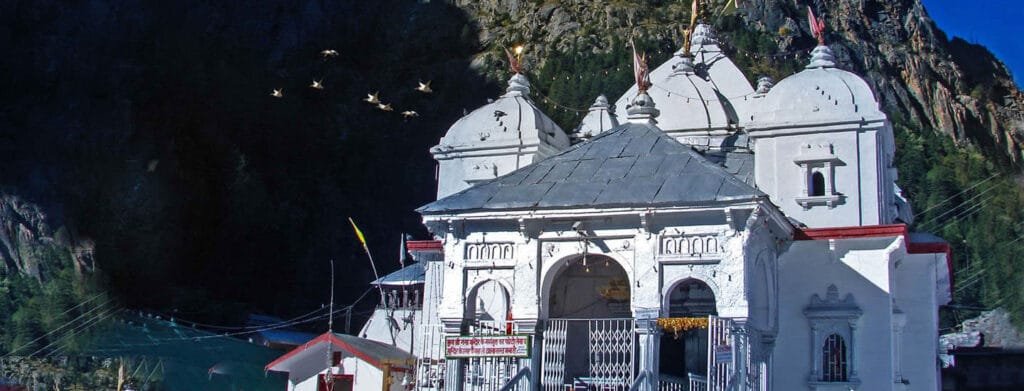**Gangotri Temple Guide**
The original Gangotri Temple was built by the Nepalese general Amar Singh Thapa and later restored in the 19th century. The temple is closed from Diwali day every year and is reopened on Akshaya Tritiya. During winter, when the Gangotri Temple becomes inaccessible due to snow, the idol of Goddess Ganga is brought down to Mukhba village. The ritual duties of the Gangotri Temple, including the supervision of the aarti ceremony, are performed by the Semwal family of pujaris. These pujaris hail from Mukhba village. High in the Garhwal Himalayas of Uttarakhand lies Gangotri, a place of immense spiritual and mythological importance. Home to the revered Gangotri Temple, it is the origin point of the holy River Ganga and a vital stop in the Char Dham Yatra. Perched at 3,100 meters above sea level, the temple attracts pilgrims, nature lovers, and spiritual seekers worldwide.

Historical and Mythological Background
The Gangotri Temple is believed to have been constructed in the early 18th century by Amar Singh Thapa, a Gorkha commander. However, the sacredness of the site predates this structure. Mythologically, Gangotri is where the Goddess Ganga descended to earth, flowing from the matted locks of Lord Shiva to cleanse the sins of humanity.
According to legend, King Bhagirath performed rigorous penance here to bring the Ganga to earth to purify the souls of his ancestors. Pleased by his devotion, Ganga descended, and the river came to be known as Bhagirathi at this point.
Architecture and Natural Setting
Constructed from white granite, the Gangotri Temple is a striking structure amidst snow-covered peaks and lush deodar trees. The temple is located on the banks of the Bhagirathi River and presents a simplistic yet powerful architectural style with a central sanctum and conical spire.
Nearby, the Bhagirath Shila marks the spot where King Bhagirath is believed to have meditated. About 19 km ahead lies Gaumukh, the actual glacier source of the Ganga, accessible via a trek.
Pooja Timings and Rituals
The temple opens every year on Akshaya Tritiya (April/May) and closes on Diwali (October/November). During this time, a rich schedule of rituals is performed daily.
| Ritual | Time |
|---|---|
| Temple Opening | 6:15 AM |
| Mangala Aarti | 6:30 AM – 7:30 AM |
| Bhog Aarti | 12:00 PM |
| Sandhya Aarti | 6:00 PM – 7:00 PM |
| Temple Closing | 8:00 PM |
Pilgrims can attend the aartis, especially the serene Sandhya Aarti, to feel the spiritual essence of the place.
How to Reach Gangotri Temple
Gangotri is well-connected by road, although the final stretch requires some planning:
- By Road: The last motorable stop is Gangotri town itself.
- By Rail: Nearest station is at Dehradun (240 km).
- By Air: The nearest airport is Jolly Grant Airport, Dehradun (250 km).
Buses and taxis are available from Rishikesh, Haridwar, and Uttarkashi.
Accommodation Near Gangotri
Several lodges, guesthouses, and dharamshalas are available in Gangotri and nearby towns such as Harsil and Uttarkashi. Accommodations range from budget stays to slightly more comfortable lodges. Advance booking is recommended during the Yatra season.
Essential Travel Tips
- Start Early: Begin your journey in the morning to avoid mountain weather changes.
- Altitude Caution: At over 3,000 meters, acclimatization is key.
- Clothing: Carry warm woollens, thermal wear, and good trekking shoes.
- Health Kit: Carry basic medications and first aid.
- Eco Responsibility: Do not litter; use dustbins or carry your waste back.
Nearby Attractions
- Gaumukh Glacier: The actual source of the Ganga, accessible via a 19 km trek from Gangotri.
- Pandava Gufa: A cave believed to have been used by the Pandavas during their exile.
- Harsil Valley: A scenic spot just 25 km from Gangotri, known for its beauty and serenity.
Gangotri Temple is more than a holy site—it’s a gateway to peace, divinity, and the beginning of India’s holiest river. With ancient legends echoing through the valleys and pristine nature surrounding the shrine, every pilgrim leaves with a deeper spiritual connection. Whether you’re on the Char Dham Yatra or seeking inner calm, let this Gangotri Temple Guide help you make the most of your journey.


